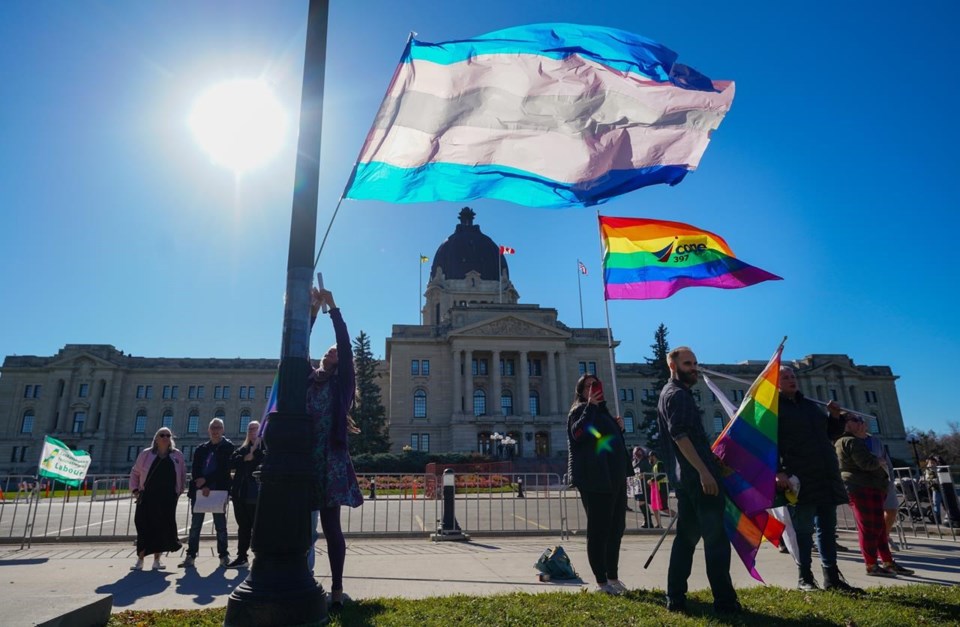REGINA — The Saskatchewan government tabled legislation Thursday invoking the notwithstanding clause to prevent children under 16 from changing their names or pronouns at school without parental consent.
A judge granted an injunction at the end of September pausing the Saskatchewan Party government's pronoun policy until a constitutional challenge could be heard later this year.
Lawyers for UR Pride, a LGBTQ organization in Regina, sought the injunction, arguing the policy could cause teachers to out or misgender children and that it violates Charter rights.
Premier Scott Moe pledged the same day to recall the legislature early to put the policy into legislation and invoke the notwithstanding clause. The clause is a rarely used provision that allows governments to override certain sections of the Charter for up to five years.
"Every child in this province has the right to a safe, inclusive and welcoming school environment. We believe that having parents involved, like outlined in the legislation today, does that and that is what's best for the child and the parent," Education Minister Jeremy Cockrill told reporters after tabling the parents’ bill of rights act.
"I think over the next number of days, we're going to get into debate here on the collision of rights and how the notwithstanding clause addresses that."
Egale Canada, a national LGBTQ organization, said the province is trampling on the rights of vulnerable children and youth. Egale has been providing legal assistance in UR Pride's challenge over the policy.
"We can all agree that young people deserve to feel safe and that parents play an important role in fostering a safe environment at home and in the community," Egale said in a statement.
"But the evidence is clear: not allowing young people to be themselves at school will cause irreparable harm by diminishing their mental health and well-being, and it even puts their lives at risk."
Opposition NDP education critic Matt Love said the bill violates children's rights.
"It's an indication that they know this policy will harm children and they're more interested in protecting themselves," Love told reporters.
He said the issue of pronouns in school is not top of mind for people.
"I'm disappointed that the priorities of this government are so out of touch that we're not here to talk about the tens of thousands of people who don't have access to a family doctor," Love said. "We're also not here to talk about schools that don't have a working roof to keep kids dry when they go to school."
The bill says if it's believed a student would be harmed because of the pronoun consent requirement, the school's principal is to direct the student to a counsellor.
However, the Saskatchewan Teachers' Federation has said schools are short counselling staff, as there is only one counsellor available for every 3,000 students.
Cockrill said the province is looking to hire more staff.
"We don't have a prescribed ratio (of counsellors to students)," he said. "But we'll certainly work with school divisions to ensure that supports are in place. But, you know, the reality is that not all supports are going to be in the school context. We have community-based supports as well."
In using the notwithstanding clause, the government is seeking to override sections of the Charter that deal with fundamental freedoms, life liberty and security of the person, and equality.
It's also seeking to override parts of Saskatchewan's Human Rights Code that address freedom of conscience, free expression and right to education.
The bill also says parents must be given at least two weeks' notice before any sexual health content is presented in schools so they can withdraw their children's participation if they choose.
Part of the bill aims to prevent people or organizations from suing the government over the legislation.
Margo Allaire, an organizer with Yorkton Pride, said most parents wouldn't worry about their children's pronouns because they have good relationships.
However, there are some who don't, Allaire said.
"For kids who don't have a safe home, this is scary."
Moe has said the policy, announced in August, has strong support from the majority of Saskatchewan residents and parents.
Saskatchewan's child advocate Lisa Broda said in a report that it violates rights to gender identity and expression.
The government is looking to extend debate on the bill to 40 hours, a move that could result in politicians sitting long hours starting next week.
This report by The Canadian Press was first published Oct. 12, 2023.
Jeremy Simes, The Canadian Press



